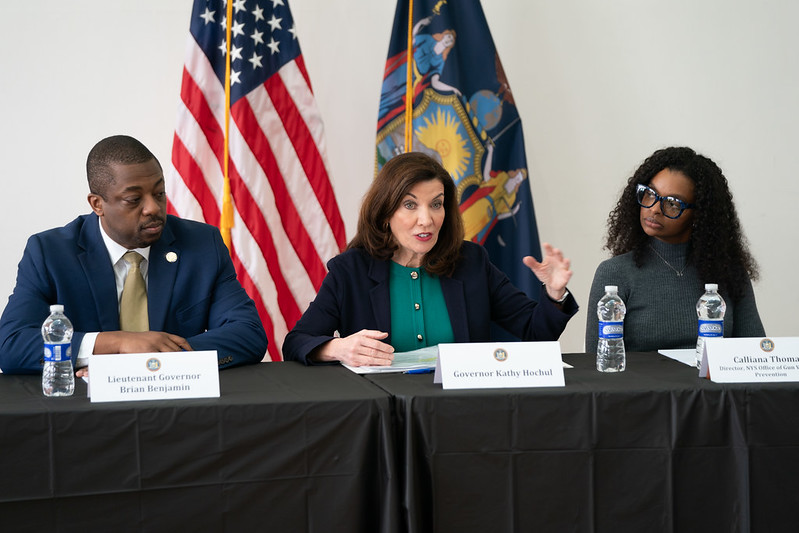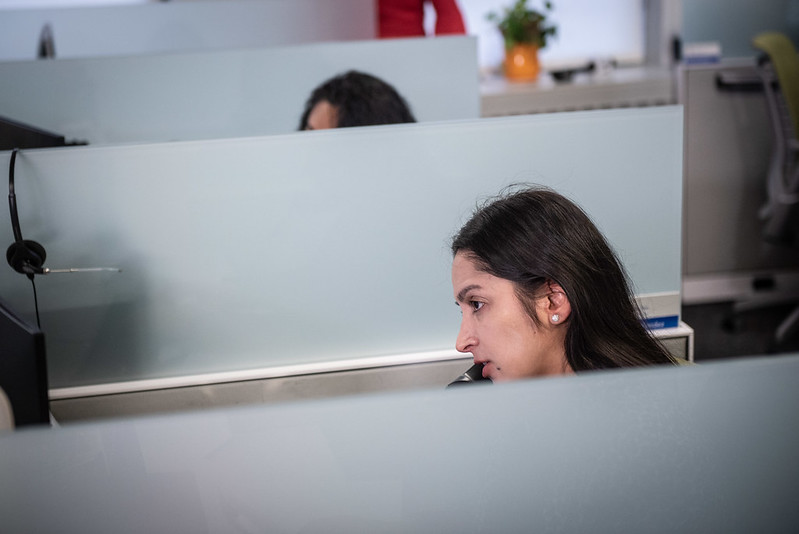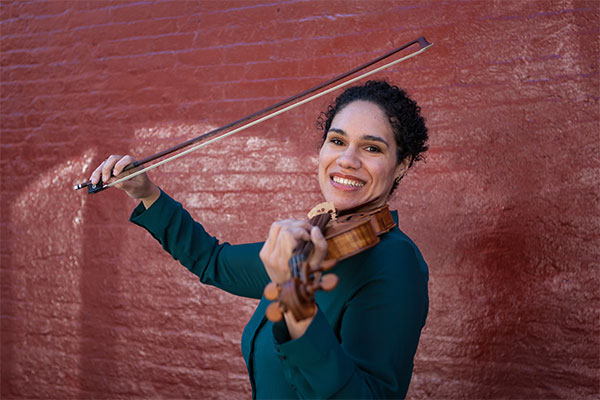No Rollbacks to Raise the Age

Top New York officials (photo: office of Governor Kathy Hochul)
Jewish tradition offers us a comprehensive blueprint for how to build just and caring communities. From the very beginning of our story, we learn that we are knit together with a clear directive toward mutual obligation and responsibility. Supporting and nurturing our children is a fundamental part of that ethos.
We were devastated to see Governor Hochul’s last-minute proposals to include rollbacks to New York’s historic Raise the Age legislation in state budget negotiations. Before the original Raise the Age bill passed in 2017, we at Central Synagogue and Congregation Beth Elohim were at the table from the beginning to build support around the legislation, joining with over 65 faith communities and justice organizations from across the city and state to mobilize support for our young people.
New York must continue to protect Raise the Age. We must resist this new call to make it easier to prosecute 16- and 17-year-olds as adults in criminal court, because that would encourage regressing back to failed, racially-biased policies of the past – and leave our children as collateral damage.
At a moment when New Yorkers are still reeling from the devastation of the pandemic, we cannot allow fear to eclipse facts. State leaders must lead with courage and resist any efforts to roll back Raise the Age. We must invest in public safety solutions that address the root causes of gun violence and give the youngest New Yorkers the opportunity to heal and flourish.
To put it simply: rolling back Raise the Age will not make New York safer. While it is clear that the uptick in gun violence is an epidemic that requires action, the Raise the Age law is not responsible for this crisis. During the first 18 months of Raise the Age, shootings in New York City remained the lowest they’ve been in decades, even as arrests and incarceration of 16- and 17-year-olds declined. It was only after widespread COVID-19 infections, death, and lockdowns that gun violence spiked, a trend that was felt across the country, including in cities where similar criminal justice reforms had not been enacted.
Jewish law carves out a special place for children, outlining their rights and what they are owed not only by their families but also by the entire community. Our children are resilient, but it is on us to ensure they have the support they need to grow and thrive. Part of that support must come in the form of setting boundaries and teaching them to be accountable for their actions, but doing so in a way that supports their development in the long term. Treating them in age-appropriate ways in the legal system strikes this balance. The family court provides accountability -- including detention and long-term placement in a residential facility in serious cases -- but it also provides mental health, education, and other supports designed to promote wellbeing and reduce recidivism. In the most serious cases, where a young person displays or uses a deadly weapon, Raise the Age dictates that the case remain in adult court, but is heard by a judge with family court training.
As we continue to process the collective trauma of the COVID-19 crisis across New York and work to uproot systemic racism from our criminal legal system, this is the moment for a bold new vision for youth justice for more resilient and safer communities. New York needs robust investments to lift incomes, promote housing security, and expand access to mental health and social and emotional learning supports in our schools. They also must invest in community-based violence prevention, alternatives to incarceration, and restorative justice programs.
We also need to ensure that full funding for Raise the Age is reaching communities, which has not happened in the five years since the law went into effect. As lawmakers in Albany finalize the state’s fiscal year 2022-2023 budget, the Governor and Legislature must streamline the process for Raise the Age implementation, making certain resources reach localities quickly to support direct service organizations led by and serving youth that are rooted in the community.
To imagine a criminal legal system and state shaped by Jewish notions of justice is to see a system that upholds the dignity of every person and is animated by the value of teshuvah, of transformation and return. To state that another way: true repentance, atonement, and healing can only happen in the community and with support, not through excessive punishment and permanent exile. New York must protect Raise the Age.
***
Rabbi Hilly Haber is Director of Social Justice Organizing and Education at Central Synagogue in Manhattan. Rabbi Stephanie Kolin is a rabbi of Congregation Beth Elohim in Brooklyn.
***
Have an op-ed idea or submission for Gotham Gazette? Email This email address is being protected from spambots. You need JavaScript enabled to view it.
How New York City Must Prepare for a Successful Launch of 988 Mental Health Crisis Hotline

988 hotline to launch this summer (photo: Michael Appleton/Mayoral Photography Office)
Suicide is a leading cause of death in the United States and the number of people who think about or attempt suicide is of course even higher. This is one of the greatest public health crises of our time and we have an opportunity to respond in a transformative way with the implementation of the 988 mental health crisis hotline.
To ensure that starting in July New Yorkers will dial 988 for a mental health crisis, not 911, we are advocating for significant investment in peers and families with lived experience to be involved from crisis response and services to hotline feedback.
In October 2020, the federal National Suicide Prevention Designation Act was passed to transform the existing ten digit number into the easy to remember 988 number for mental health emergencies. The need is great. In 2020, the National Suicide Prevention Lifeline received nearly 2.4 million calls.
In New York, we are glad to see that $80 million has been invested by the state in a critical 988 hotline fund and a 988 surcharge established that will offer sustainable funding each year. However, we must take further action before the hotline number goes live this July.
For 40 years, the National Alliance on Mental Illness of New York City (NAMI-NYC) has rooted its work in the power of peer and family support and we advocate for their inclusion in 988 implementation. Here are the key next steps:
First, New York must invest in a peer-led, non-police response to mental health crises. Individuals and families affected by mental illness, including the NAMI-NYC staff, have been waiting for an opportunity like this to more fully transition to non-police response for mental health crises. Half of all people killed by the police live with mental health issues.
During the pandemic, we have heard countless stories from families we serve on our own helpline. When one mother called 911 during a crisis, rather than receiving help for her son, a 23-year-old Black man, the police arrived with their guns drawn. Since 2015, the NYPD has killed at least 18 individuals experiencing mental health crises and 15 of those individuals were Black or other people of color.
We need peers, not police, responding to mental health crises.
The new $21 million state investment in 20 Safe Options Support (SOS) teams announced by Governor Hochul alongside Mayor Adams and intended to address recent concern about subway safety, includes both mental health professionals and police.
The 988 rollout requires further investment in training and developing a pipeline to certify young adult and adult peers and their families. Practitioners and advocates have long praised Oregon’s CAHOOTS program and we have seen the success of New York City’s B-HEARD pilot program in Northern Manhattan, which dispatches two EMTs or paramedics and a mental health professional to the scene of mental health emergencies.
We need a mental health response to a mental health crisis, not to reinforce the criminalization of people living with mental illness.
Second, New York must fund 24/7 crisis stabilization programs with peer specialists before sending people to emergency rooms.
We support $100 million for 12 new crisis stabilization centers, three of which will be in New York City, to keep people living with mental illness out of emergency rooms. In addition, Certified Behavioral Health Clinics are well-positioned to provide these services 24/7, 365 days a year without appointments or referrals.
Crisis stabilization programs can provide appropriate referrals for services and supports in their communities, and connect New Yorkers to wraparound supports leading to long-term, safe, and stable health care, housing, and employment. In Tucson, Arizona, one program–open 24/7 for walk-ins and up to 23 hours a day for stabilization services–has found that 60% of people served return to the community and do not require hospitalization.
Additionally, studies show that the involvement of peer specialists at such programs can reduce inpatient admissions and emergency room use as well as reduce stigma and bring hope of recovery unlike any professional staff can.
Let’s keep New Yorkers with mental illness out of emergency rooms and police departments.
Third, we must elevate the voices of peers with mental illness and their families. While stakeholders throughout New York are in communication about 988 implementation, we fully advocate for even greater participation of people living with mental illness and their families to be an instrumental and central part of the design, planning, implementation, reporting, and improvement of this program.
We know that communities of color have been disproportionately impacted by the pandemic, compounded with systemic racism, and that LGBTQ+ communities, particularly young adults, are at greater risk of attempting suicide. We need peers with mental illness and their families from underserved communities to be a part of 988 planning committees and engage in how they will participate in crisis response, crisis stabilization, and community services, which is almost more important than the 988 number itself.
From cross-agency and provider collaboration to the technical requirements of referring callers to local behavioral services, there are so many unknowns of implementation these next several months. Proactive community feedback and insight would be critical even with an introduction of an early 988 pilot.
If we truly want to divert mental health calls from police to behavioral health providers, New York City needs a clear plan for peer involvement and feedback across the board. We will continue to advocate alongside our community partners to ensure that people affected with mental illness – our family, our friends, our neighbors, our colleagues – are not endangered when reaching out for help.
***
Matt Kudish is the Executive Director of the National Alliance on Mental Illness of New York City (NAMI-NYC), which supports families and individuals affected by mental illness. To join our advocacy efforts around 988, visit here. On Twitter @NAMINYCMetro.
***
Have an op-ed idea or submission for Gotham Gazette? Email This email address is being protected from spambots. You need JavaScript enabled to view it.
Celebrating the History of New York’s Women in Philanthropy

Jessie Montgomery, a Van Lier Fellow at Third Street Music Settlement then at the American Composers Orchestra (photo: Ari Mintz for The New York Community Trust)
During Women’s History Month, we pay tribute to women who have been central figures in the ongoing campaign for equality.
While it’s important to recall those who have led the charge for voting rights and equal pay, we often overlook the pioneering women whose philanthropy has shaped our city and trailblazed for subsequent generations of women.
Throughout the past century, women have been making a mark on New York through their charitable giving. While their generosity and vision has long been overshadowed in public conversations about philanthropy, studies have continuously shown that women are more likely to give—and give at a higher level—to charitable causes than men at every income level.
I've seen this dynamic play out time and again throughout my career in philanthropy and at The New York Community Trust, which has been working closely with New York philanthropists for nearly a century.
You may not know the names of women like Mildred Anna Williams, Jadin Wong Chichester, or Sally Van Lier, but these figures deserve our attention—both for what they've accomplished so far, what they continue to do through their philanthropy, and how they inspire the next generation of philanthropic women.
Williams’ story is emblematic of the substantial impact of New York’s women in philanthropy. When Williams died in 1939, she recalled her own struggles as a young woman and set aside $2 million in her will to create the Mildred Anna Williams Fund in The New York Community Trust to “support activities conducive to the welfare of girls.”
Because that gift appreciated in value over time, Williams’ charitable impact has multiplied. Over the past three decades alone, the fund has provided $27 million in grants to nonprofits that support girls and young women. Recent grants from her fund have helped young women navigate teen parenthood, find shelter away from abuse or traffickers, and become activists. Her gift has been truly transformational to so many.
Her fund not only supports direct services for these young New Yorkers, it also promotes advocacy and infrastructure to improve their lives. Her philanthropy has helped open a women’s health clinic in Long Island City and supported advocacy for legislation to curtail online sexual harassment.
While few modern New Yorkers are familiar with her name, Williams’ impact on the lives of women across our region cannot be overstated.
The same is true for Jadin Wong. Growing up in California’s gold country prior to the Great Depression, Wong pined for a career in show business. As a teenager, she climbed out of her bedroom window and joined a touring company, performing with a young Danny Kaye before being caught by a truant officer.
Over the years, she danced in Europe, appeared in movies including “The Pink Panther,” and befriended stars such as Noel Coward. She settled in New York, appearing in Broadway shows including “The King and I” and “The World of Susie Wong,” and started a management company that represented more than 400 Asian and Asian-American artists—opening doors for hundreds of performers who would have otherwise been overlooked.
Her travels increased her determination to help others with no contacts or money. Before her death in 2010, she started the Jadin Wong Educational Fund in The New York Community Trust, specifying that the money should go to artists, musicians, and dancers of Asian descent. Since then, the fund has enriched the arts and helped artists follow their passions.
Sally Van Lier provides another example of a woman who drew on her own experiences to create a legacy of helping others.
Van Lier knew what it was like to be a struggling artist. Starting out as an actress, she and her husband Edward, a real estate investor, were passionate patrons of the arts long after she left the stage. After Edward’s death in 1978, she told The Trust she wanted to set up a fund to help talented, aspiring artists, especially those with very little money.
That led to the Van Lier Fellowship Program in The New York Community Trust, which offers emerging artists financial assistance, mentoring, studio space, and other help. Since 1991, the fellowship has awarded more than $17 million through 100 arts training groups, ranging from well-known institutions such as the Alvin Ailey American Dance Theater to smaller groups such as Theater Mitu. More than 2,000 artists have been Van Lier Fellows. Many have gone on to win top prizes in their fields including the MacArthur “genius grant” and the Pulitzer Prize.
As we celebrate Women’s History Month, it’s important to honor the generosity and vision of these and many other women who have been making a mark on our city for decades—and will continue to do so for generations to come.
***
Marie D’Costa is vice president and chief development officer for The New York Community Trust. She is a Founder’s Circle member of Women of Color in Fundraising and Philanthropy. On Twitter @NYCommTrust.
***
Have an op-ed idea or submission for Gotham Gazette? Email This email address is being protected from spambots. You need JavaScript enabled to view it.




